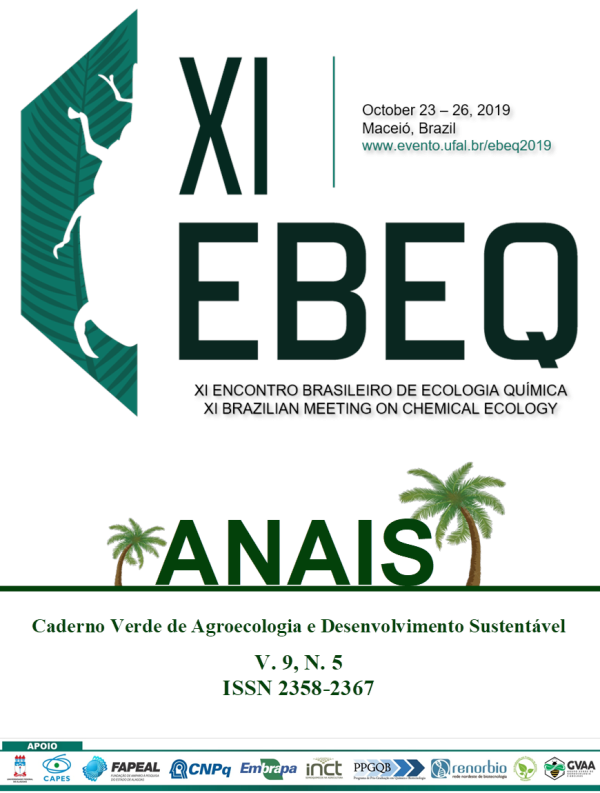INFLUENCE OF SYNTHETIC HERBIVORY INDUCED PLANT VOLATILES ON MAIZE PLANTS DEFENSE
Keywords:
HIPVS, PLANT DEFENCE, Zea mays, STINK BUGSAbstract
Herbivore-induced plant volatiles (VPIHs) can be used in different strategies to protect plants against herbivores, such as using synthetic compounds in dispenser to attract natural enemies or inducing plant defence. Therefore, the aim of this study was to evaluate whether synthetically applied VPIHs influence the defence of healthy maize plants. For this purpose, the production of volatile compounds from maize plants (Sintetico Spodoptera genotype) exposed to the following VPIHs: indole, (E)-2-hexenyl acetate, (Z) -3-hexenyl acetate, (RS)-linalool, DMNT and (E)-β-farnesene were evaluated. Healthy maize plants were exposed to these volatiles for 24h. After this, the exposure was stopped and the plants were allowed to rest for one hour. Then the exposed plants were submitted or not to herbivory of virgin females of the stink bug Dichelops melacanthus. Plants that were not exposed to the compounds were also submitted or not to the herbivory of D. melacanthus, as control. The volatiles of the plants submitted to the different treatments were collected by air-entrainment in the periods 0-48, 0-72 and 0-96h after the beginning of herbivory. Aeration extracts containing the volatiles emitted by plants were analysed by CG-FID and CG-MS. Principal component analysis showed that none of the compounds induced the production of volatiles on healthy plant, this treatment grouped with untreated maize plants at all times evaluated. However plants exposed to linalool and indole and to herbivory formed a separate group from herbivory and from the other treatments. The results obtained so far showed that VPIHs applied synthetically alter the volatile production of plants subjected to herbivory stress, which indicates that the priming defence could be been activated. Behavioural bioassays with plants exposed to VPIHs and sequentially to herbivory are being conducted to evaluate whether the observed differences in volatile production are related to plant defence.Downloads
Published
How to Cite
Issue
Section
License
Termo de cessão de direitos autorias
Esta é uma revista de acesso livre, em que, utiliza o termo de cessão seguindo a lei nº 9.610/1998, que altera, atualiza e consolida a legislação sobre direitos autorais no Brasil.
O(s) autor(es) doravante designado(s) CEDENTE, por meio desta, publica a OBRA no Caderno Verde de Agroecologia e Desenvolvimento Sustentável, representada pelo Grupo Verde de Agroecologia e Abelhas (GVAA), estabelecida na Rua Vicente Alves da Silva, 101, Bairro Petrópolis, Cidade de Pombal, Paraíba, Brasil. Caixa Postal 54 CEP 58840-000 doravante designada CESSIONÁRIA, nas condições descritas a seguir:
O CEDENTE declara que é (são) autor(es) e titular(es) da propriedade dos direitos autorais da OBRA submetida.
O CEDENTE declara que a OBRA não infringe direitos autorais e/ou outros direitos de propriedade de terceiros, que a divulgação de imagens (caso as mesmas existam) foi autorizada e que assume integral responsabilidade moral e/ou patrimonial, pelo seu conteúdo, perante terceiros.
O CEDENTE mantêm os direitos autorais e concedem à revista o direito de divulgação da OBRA, com o trabalho simultaneamente licenciado sob a Licença Creative Commons do tipo atribuição CC-BY.
O CEDENTE têm autorização para distribuição não-exclusiva da versão do trabalho publicada nesta revista.
O CEDENTE têm permissão e são estimulados a publicar e distribuir seu trabalho online (ex.: em repositórios institucionais ou na sua página pessoal) a qualquer ponto antes ou durante o processo editorial, já que isso pode gerar alterações produtivas, bem como aumentar o impacto e a citação do trabalho publicado.








